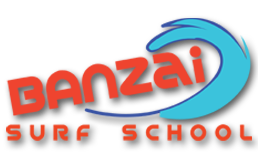 Talking ‘Dude’ 101
Talking ‘Dude’ 101
Surfing carries a long tradition of slang terms. Most of us know the old-school terms like ‘wipeout’ and ‘cowabunga’. Here’s a list of some of our newer favorites. This should help you translate things your instructor says.
“Going off” – “Dude, Brookhurst is going OFF!” This means the waves are good. You could also say, it’s “off the richter”, “cranking”, “macking” or “epic”. (“awesome” is way overused).
“Inside” – “We got caught inside”. This is the area closer to the beach where smaller waves are breaking. However, on bigger days, there is an area just inside called “the impact zone”. This is where you think you might be safe from the waves, but instead you get your clock cleaned by big waves because, in fact, It’s better to be sitting outside where the wave won’t break, and then laugh at your friends who didn’t know that.
“Outside” or “Out the Back” – “Dude, the outside break is going off.” This means the farthest break from the beach, or “outside” of the breaking waves where the (supposedly) more experienced surfers are sitting. If you’re in the water and hear someone say ‘outside’, that means big waves are coming; Move further out, … quickly.
“Onshore/Offshore” – “This morning there were ‘nuggets’, but it’s onshore now.” We’re talking about the WIND here; Onshore means it’s blowing ‘onto the shore’, making the waves mushy and crumbly, not usually desirable. “Offshore” winds blow off the shore into the waves, holding them open for better ‘barrels’. (Most large land masses – ie USA, Mexico, UK – will have onshore winds in the afternoon, as the land heats up)
“Closeout” – “The whole place was wally and closed-out.” A closeout is when the whole wave (or ‘wall’) breaks at once, leaving no place for a surfer to slide across the open/unbroken wave face. Closeouts are the least desirable waves for surfing.
“Left” or “Right” – “Wow, that’s a nice left.” This term refers to the direction that a wave will peel (or is breaking), from the surfer’s perspective. So, when seen from shore, a left peels across the beach towards your right. In Hawaii, the famous Banzai Pipeline (our namesake 🙂 is a left.
“Swell” – “There’s a good swell this weekend.” We confuse more people with this simple term. It means a wave event, or a series of days when there will be waves. A swell is usually coming from a particular direction, and is labeled a “south swell”, a “west swell”, or just “a big south”.
“Tubular” – “Dude, nobody’s said ‘tubular’ since the 1980’s.” So yes, it’s not new, and more commonly now called “barreling” or “hollow” or “pitching”. It means when a wave opens up and breaks hard, top-to-bottom, “gnarly”, allowing room for a surfer to maneuver through. (Not usually desirable for beginning surfers)
“Frothing” – “I checked the waves this morning, and it was so good I was frothing.” “Frothing” is the new “stoked” – when a surfer is excited.
“Macking” – “Newport Beach was MACKING yesterday.” = huge waves. You could also say “maxxed out”, “double (or triple) overhead”, “cranking”, “outta hand”, or how about just “big”.
“Kook” – “There are too many kooks out here”. A beginning surfer; Not a term of endearment. Also called, “barneys”, “slugs”, or my favorite, “clutter”.
“Set” – “We got picked off by a cleanup set.” This means a set of waves. Most sets have anywhere from two to eight waves, unless you’re paddling back out; That always seems to be the moment you’ll get bombed by a set of a dozen or more. It still beats the heck outta golf.
“Over the falls” – “I tried to push through but went over the falls”. This is a term most beginners will learn the hard way. This is when you get stuck on the top of the wave and get thrown over with it – a sadistically fun wipeout to watch. This can happen while riding OR just paddling out. Humorous on small waves, tragic when it’s big.
“Pearl” – “You pearled on that wave, you kook”. This is one of the first words beginners learn, because, well, beginners pearl a lot :). This is when the nose of the board dives under the water, usually causing a rodeo-clown sinus-flooding wipeout. It comes from the endearing phrase ‘to go pearl-diving’. More on how to prevent this in this blog.

